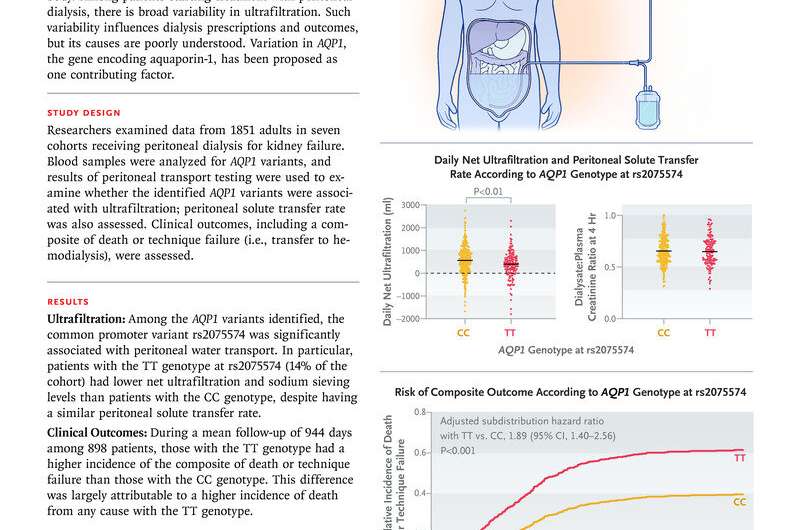Common genetic variation could make home dialysis less effective for some patients

A common variation in a specific gene could make home kidney dialysis treatments less effective for some patients, leading to worse outcomes and even death in some cases.
Home dialysis therapies such as peritoneal dialysis have increased in popularity in recent years, in both developed countries like the United States and developing countries.
Home therapies like this are advantageous as they can reduce the cost to countries' health services, as well as making these treatments more accessible for patients living in remote or rural areas. They also require less support from trained medical or technical staff.
But new research co-led by Keele's Professor Simon Davies has found that such treatments may be less effective if patients have a common variation in a gene known as AQP1 (Aquaporin-1).
Peritoneal dialysis is dependent on a process called ultrafiltration—the ability to remove excess water to restore normal body-fluid status, as well as to clear waste substances from the body, a process which is governed by genes including AQP1.
Publishing their findings in the New England Journal of Medicine, the international research team found that variations in the AQP1 gene affected how successfully patients' bodies performed ultrafiltration, which subsequently affected the outcome of their treatment.
They used data from over 1800 peritoneal dialysis patients, first assessing the impact that different variations in AQP1 may have on the patients' treatment, confirming observations made in the laboratory. Having discovered the important variant, they then validated their findings in 898 patients to assess its impact on survival. The 15% of patients with the variant experienced significantly worse outcomes.
Simon Davies, Professor of Nephrology and Dialysis Medicine at Keele University said: "This is the first time that a single gene has been shown to determine clinical outcomes in people on dialysis. We have suspected for some time that there are important differences between people in how well they can remove fluid using peritoneal dialysis.
"Now that this is more clearly understood, clinicians will be able to recognize this problem earlier and make quite simple prescription changes to prevent the increased mortality risk. I am especially proud of this work and the part played by Keele, including my colleague Mark Lambie and previous Ph.D. student, Zanzhe Yu, who contributed the data from China."
More information: Johann Morelle et al, AQP1 Promoter Variant, Water Transport, and Outcomes in Peritoneal Dialysis, New England Journal of Medicine (2021). DOI: 10.1056/NEJMoa2034279



















